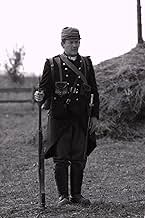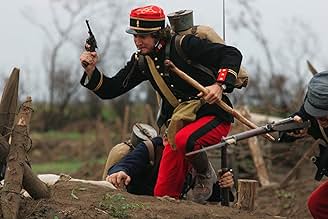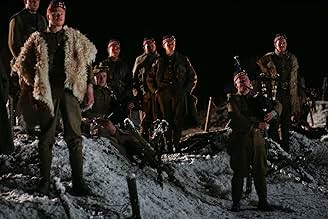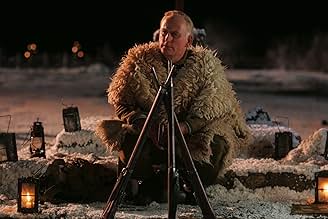En diciembre de 1914, una tregua no oficial de Navidad en el frente occidental permite a los soldados de los lados opuestos de la Primera Guerra Mundial obtener información sobre la forma de... Leer todoEn diciembre de 1914, una tregua no oficial de Navidad en el frente occidental permite a los soldados de los lados opuestos de la Primera Guerra Mundial obtener información sobre la forma de vida de los demás.En diciembre de 1914, una tregua no oficial de Navidad en el frente occidental permite a los soldados de los lados opuestos de la Primera Guerra Mundial obtener información sobre la forma de vida de los demás.
- Nominado a 1 premio Óscar
- 6 premios ganados y 12 nominaciones en total
- Anna Sörensen
- (as Diane Krüger)
- Anna Sörensen
- (doblaje en canto)
- Nikolaus Sprink
- (doblaje en canto)
- (as Rolando Villazon)
- Dirección
- Guionista
- Todo el elenco y el equipo
- Producción, taquilla y más en IMDbPro
Opiniones destacadas
I cannot think of a single bad thing to say about the film. And this from someone who usually avoids foreign language films like the plague because it annoys me when the words are out of time with the movement of the lips.
I thought that using actors from each of the countries involved in the conflict was a master-stroke and made it all so much more believable. I shed a tear at the end, though I could see why the men needed to be moved from the front having made friends with 'the enemy.' I know that this is going to be a must see film for me every Christmas and I am eagerly awaiting the release of the DVD.
Based on a true story, the film opens with the usual callous killing among three groups of soldiers - German, French, and Scottish - who face an oncoming Christmas Eve in the trenches, the realities of fighting have precluded their getting time to retreat for air. But a miracle happens: among the Germans is a famous opera tenor Nikolaus Sprink (Benno Fürmann) who has aligned with his fellow troops in the trenches, hoping he can bring some minor sense of Christmas and understanding to them. His soprano partner Anna Sorensen (Diane Kruger) finds a way to be with him in the trenches on Christmas Eve, 1914. Meanwhile the disgruntle troops of all three sectors are planning meager festivities and a bit of relaxation even in the trenches as the bodies of the day's plunder lie in the snow of no man's land. We get to know the French Lieutenant Audebert (Guillaume Canet) and his orderly Ponchel (Dany Boon), the German head of the regiment Horstmayer (Daniel Brühl), and the Scots - especially the priest/medic Palmer (Gary Lewis).
Christmas Eve comes and the voice of Sprink (in reality the tenor Rolando Villazón) sings 'Stille Nacht', rising out of the trenches to sing in the open of no man's land. Soon he is accompanied by the Scottish bagpipes and the 'chorus' of the Germans, the Scots and the French. They all emerge, share gifts of champagne and other libations, and agree to a cease-fire in honor of the holiday. It is in this magic moment that the true personalities of these warring men surface and each is seen as a vulnerable puppet of the WW I, exchanging addresses to meet after the war. Anna Sorenson has managed to enter the scene and during a communal mass led by Palmer she sings (the voice is Natalie Dessay) an Ave Maria (composed by the film's composer Philippe Rombi): the lovers have previously sung a duet version of Bach's 'Bist du bei mir'. For that moment in time the horrors of war melt and the camaraderie of the men glows and is carried into Christmas Day when all three groups of soldiers agree to bury their dead together. Of course the brutality and ignorance of war re-engages and the leaders of the three groups enter camp and threaten courts martial and punishment for the troops' lack of military discipline. The film ends in a manner that leaves the audience able to integrate the happenings of that Christmas Eve on the futures of these men.
The script is superb, the cast is uniformly excellent, the sets and cinematography are creatively moody, and the musical score by Philippe Rombi is one of the finest in years: the ending song 'I'm Dreaming of Home' deserves to become a standard. Would that everyone could see this film, a bit of global hope in the cloud of the destruction that shadows our world right now. Highly recommended. Grady Harp
By depicting the feelings and destinies of the soldiers, the film demonstrated the absurdity of war and how each soldier is more than a mere cannon target. It is a commentary on the utter stupidity of politics governing war events from behind curtains while not actually experiencing the real war. By depicting a unique event in European war history that occurred on Christmas day 1914 it shows viewers that Europeans can be as one even as "enemies".
About ten years ago I watched Paul McCartney's video "Pipes of Peace" and thought that what it depicted was completely fictitious--nothing more than pacifists' dreams. I have now learned that it was true.
Wow, what an amazing movie. As a rule I generally tend to blacklist war movies but this so different.
This is in no way about the glorification of war but instead tells a tale of a group of human beings that see past their differences for one night.
Apparently all based on true events known as the The Christmas Truce of 1914.
I highly recommend this movie to any and all.
¿Sabías que…?
- TriviaThe character of the Male opera singer is based on that of German tenor Walter Kirchhoff (1879-1951), who traveled to the front in order to perform for the troops. His performance was met by cheers from the French lines, where upon he decided to climb onto no-mans-land to see who was cheering.
- ErroresWhen Anna and Nikolaus talks about the time they met for the first time, they say "Oslo". Oslo, capitol of Norway, was called Kristiania until 1924.
- Citas
Horstmayer: I heard last night about your wife. If you like, I can get a letter through to her.
Lieutenant Audebert: Why would you do that? If you got caught...
Horstmayer: [scoffs] One letter won't stop us winning the war. And anyhow, when we'll have taken Paris and it's over, you can invite us for a drink in Rue Vavin.
Lieutenant Audebert: You don't have to invade Paris to drop round for a drink.
- ConexionesFeatured in Today: Episode dated 10 November 2005 (2005)
Selecciones populares
- How long is Joyeux Noel?Con tecnología de Alexa
Detalles
- Fecha de lanzamiento
- Países de origen
- Sitios oficiales
- Idiomas
- También se conoce como
- Joyeux Noel
- Locaciones de filmación
- Productoras
- Ver más créditos de la compañía en IMDbPro
Taquilla
- Presupuesto
- EUR 18,151,814 (estimado)
- Total en EE. UU. y Canadá
- USD 1,054,361
- Total a nivel mundial
- USD 17,709,155
- Tiempo de ejecución1 hora 56 minutos
- Color
- Mezcla de sonido
- Relación de aspecto
- 2.35 : 1
Contribuir a esta página


![Ver Bande-Annonce [VO]](https://m.media-amazon.com/images/M/MV5BY2UwMGZkODEtMTAzZi00NDVlLWI5YTktMjY1NTgyYmVlMWE2XkEyXkFqcGdeQXRodW1ibmFpbC1pbml0aWFsaXplcg@@._V1_QL75_UX500_CR0)






































